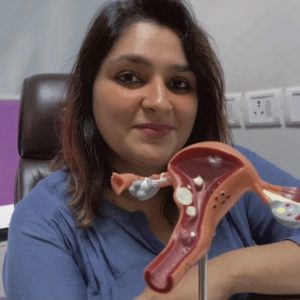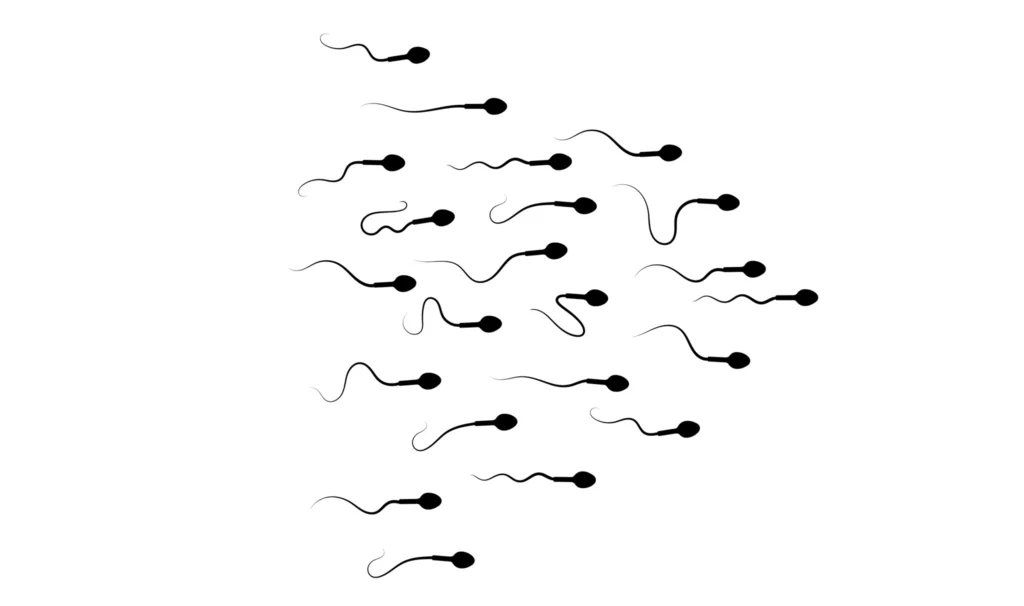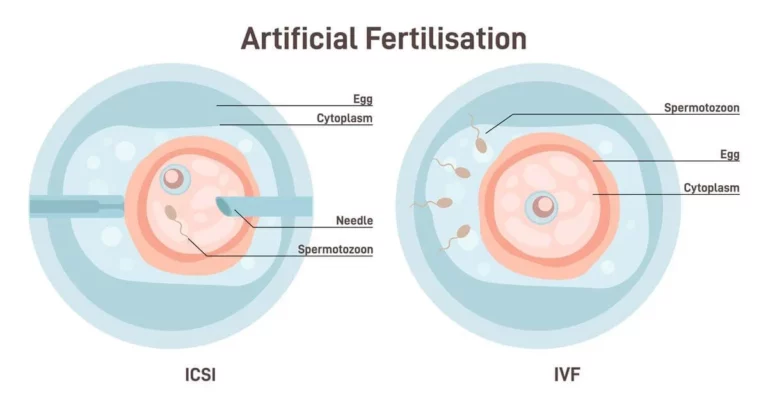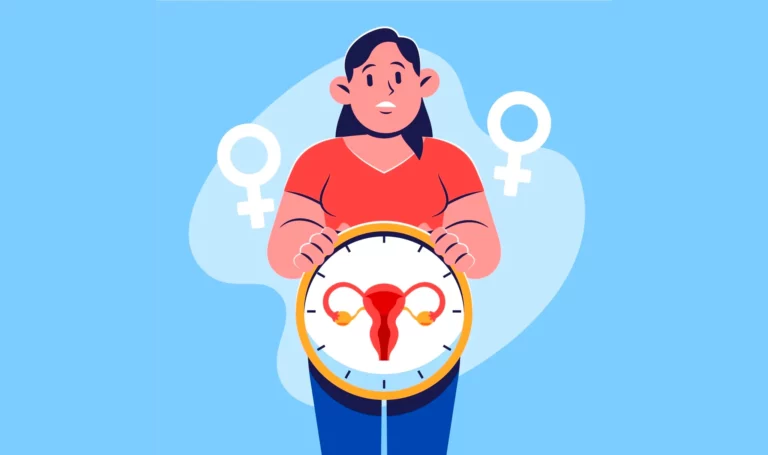From age and lifestyle to disturbed functioning of the ovaries or testicles, infertility cases in India are escalating rapidly. According to a recent report issued by AIIMS (All India Institute of Medical Sciences), about 10-15% couples in India are struggling with some kind of infertility issues.
Infertility can be defined as a couple’s incapability to attain pregnancy after a year of unprotected intercourse. There are several factors of infertility, contributed by both men and women. In women, infertility is concerned with ovulation issues, poor egg health, hormone imbalances, reproductive structure abnormalities, and related factors. Whereas, in men, infertility is concerned with poor sperm production, sperm abnormalities, and blockages preventing sperm dispatch.
A new WHO report revealed that almost 50% of infertility cases in India are induced by male factors. Sperm health problems are at a rise in Indian men. One such common sperm problem is Teratozoospermia, that we will be discussing today in this article. We will talk through its types, causes, its diagnosis, available treatments, how couples could get pregnant with it.
Increase your pregnancy chances with Nory Ovulation Kit
What is Teratozoospermia?
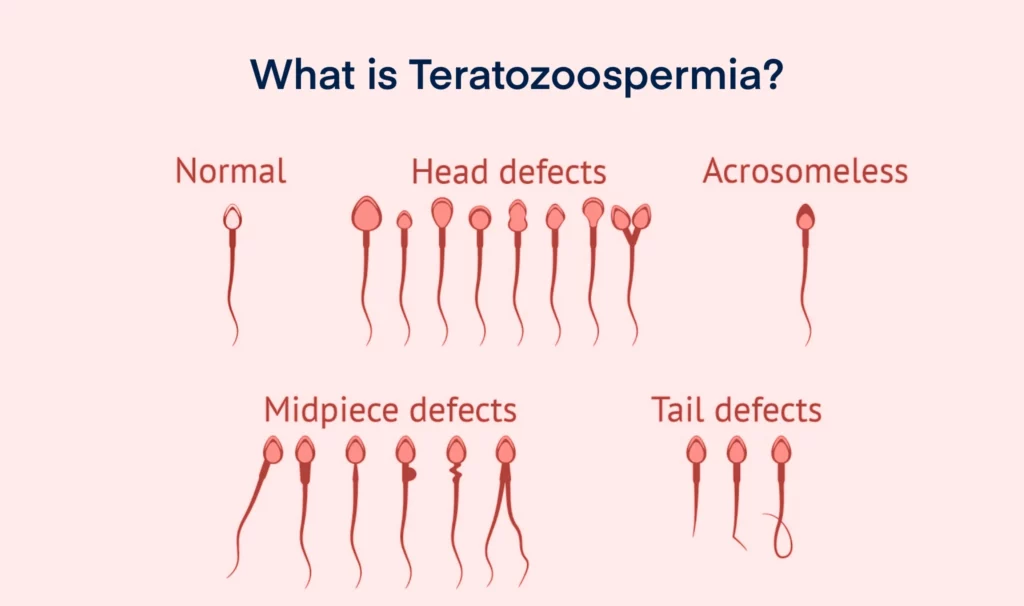
A man’s sperm is considered healthy when:
- The head of the sperm is precisely oval.
- The sperm has a single, long tail.
- The sperm has a neck portion right below the head that is thicker than the tail.
- The complete length of the sperm is around 50 micrometers, with the head 5-6 micrometers in length and 2.5-3.5 micrometers in width.
Any abnormality in the morphology (shape and form) of the sperm is defined as teratozoospermia, otherwise known as teratospermia. A man with any defect in his sperm’s head, midpiece or tail is considered to have this condition.
According to the WHO, a man is classified as teratozoospermic if his ejaculated semen contains more than 96% of abnormal sperm. On the other hand, according to Kruger’s criteria, a man with motile sperm that has more than 85% abnormally shaped sperm is classified as teratozoospermic. A man with this condition has a lower potential to fertilize a female’s egg, causing infertility.
Types of Teratozoospermia
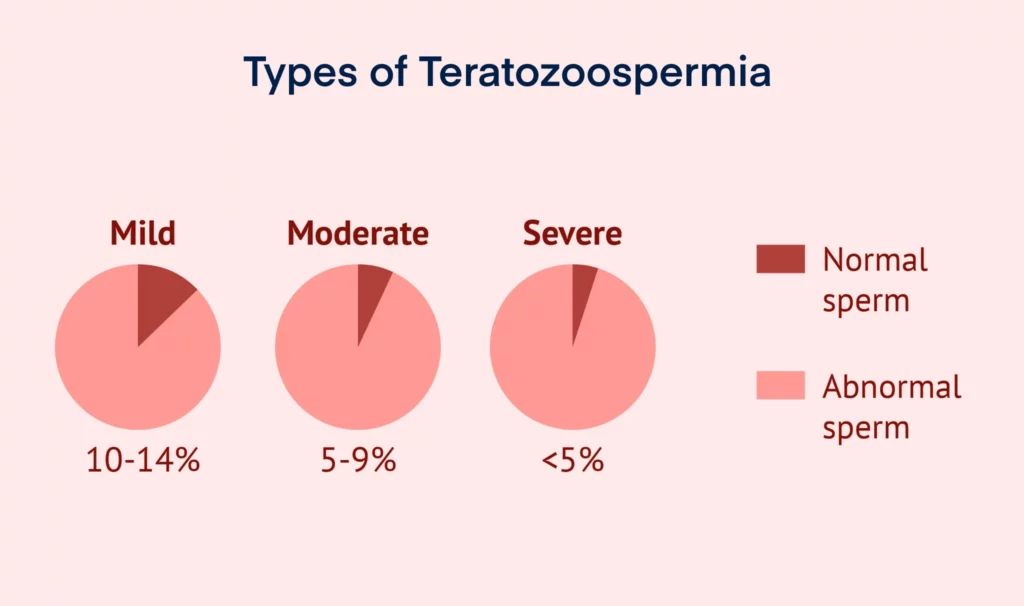
While defining teratozoospermia, doctors generally start with determining the type of abnormality in the sperm morphology, whether it is concerned with head, midpiece or tail of the sperms. And then, classifying the condition depending on the severity of the condition as follows:
- Mild teratozoospermia: When a semen analysis concludes the number of normal sperm in the ejaculated semen is between 10-14%. Men with mild severity can still get pregnant naturally.
- Moderate teratozoospermia: When the normal sperm in the semen is between 5-9%. Though men with moderate severity have a very low chance of natural pregnancy, conception can occur with IVF-ICSI (Intracytoplasmic Sperm Injection) treatment.
- Severe teratozoospermia: When the normal sperm in the semen is fewer than 5%. Men with severe teratospermia are incapable of attaining a natural pregnancy. Treatments such as ICSI or advanced ICSI called IMSI (Intracytoplasmic Morphologically-selected Sperm Injection) can be helpful.
Apart from their classification depending on the severity of the sperm abnormality, teratospermia is also defined by more types:
Astheno Teratozoospermia
This condition is a combination of asthenozoospermia and teratospermia. The chances of a man inducing conception depends on sperm morphology, motility and count. In this condition, man has poor sperm motility and morphology. Though there is no astheno teratozoospermia treatment available, natural lifestyle improvements can improve the condition to some extent. However, ICSI and IMSI treatment can be considered for pregnancy.
Oligo Astheno Teratozoospermia
This condition is a combination of oligospermia, asthenozoospermia and teratospermia. Man with this condition suffers from poor sperm count, motility and morphology. No oligo astheno teratozoospermia treatment is available either, IMSI is the best treatment to possibly have a child with the condition.
Teratozoospermia Causes
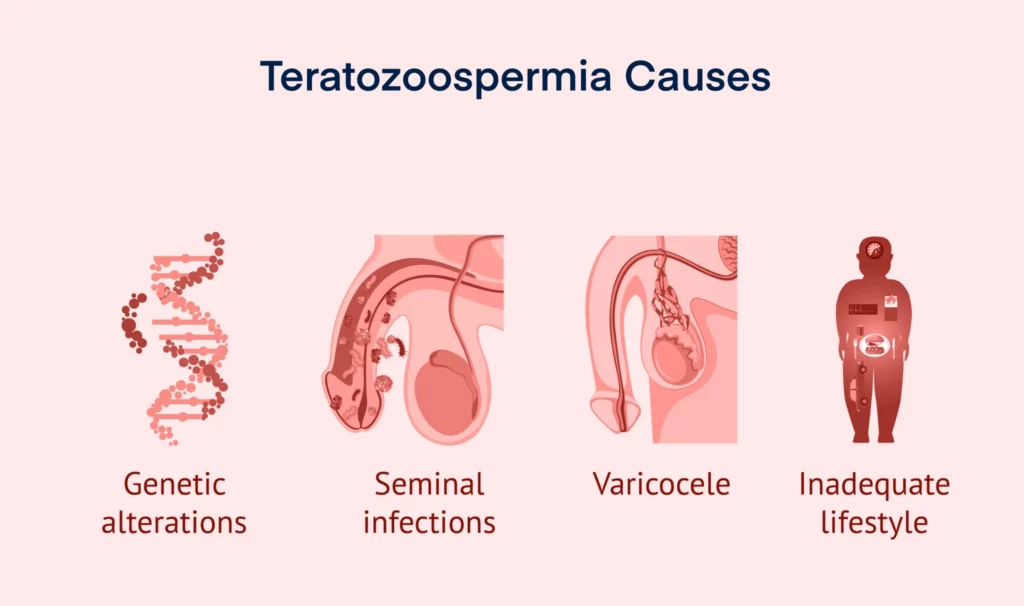
Though the definite cause of teratozoospermia or similar conditions are not yet determined, there are few possible factors that are considered to affect sperm morphology including:
- An infection, inflammation or injury in the testicles.
- Veins in the scrotum (skin pouch that carries the testicles) become swollen. Also known as varicocele.
- Genetic abnormalities
- Having a vasectomy surgery done (surgery that sterilizes a man).
- Exposure to radiation or toxins
- Diabetes
- Having unhealthy habits such as a poor diet, wearing tight clothes, smoking, drinking alcohol or consuming recreational drugs.
The bright side is, some factors such as testicle infections and inflammation, diabetes and unhealthy habits can improve with medical help and habitual changes. In such cases, sperm morphology will eventually improve and the man could possibly induce conception.
Teratozoospermia Symptoms and Diagnosis
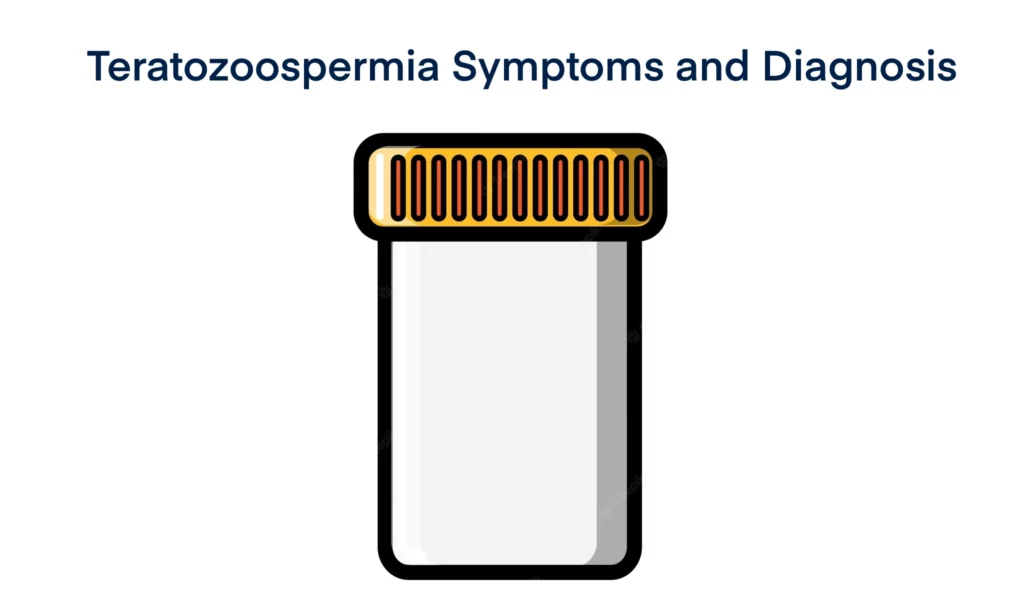
The condition does not have any noticeable side effects, patients find out about the condition during a fertility examination. The only sign that may indicate the condition is experiencing male infertility.
On the other hand, talking about the diagnosis of the condition, teratozoospermia can be determined through a semen analysis test. This test involves analysis of spermatozoa (sperm cells that are mature) through microscope. Urologist strains a man’s semen sample with methylene blue dye and analyzes the morphology of the sperm cells, to find out if the man has any morphological abnormalities.
Teratozoospermia and Pregnancy Rates
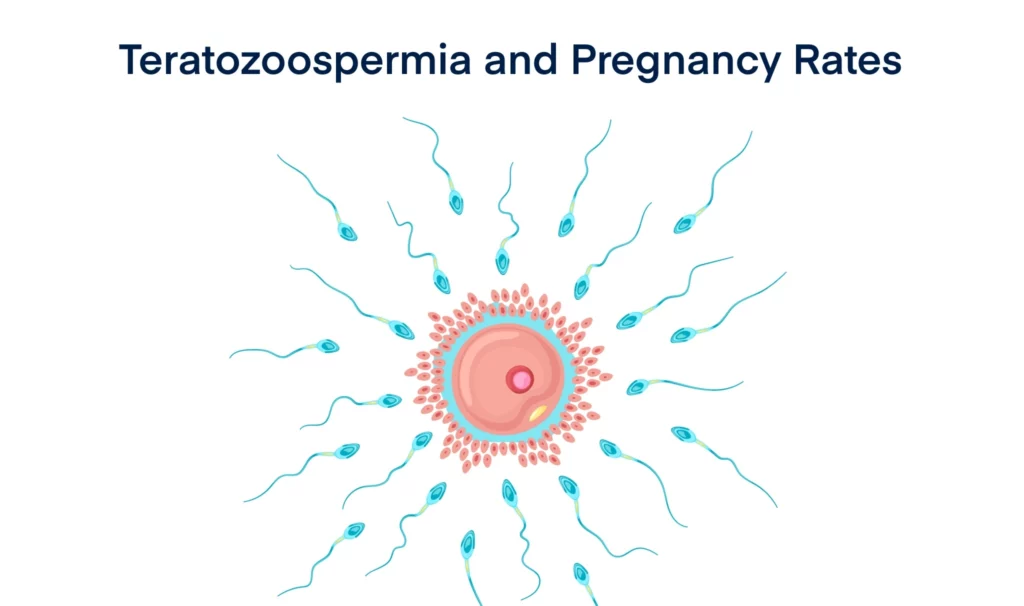
Pregnancy rates with teratozoospermia differ depending on the severity of the condition, other sperm health parameters such as sperm count and motility, and presence of other fertility problems in him or the female partner.
For a man with mild teratospermia, a healthy sperm count and motility, and having no other fertility issues is quite likely to conceive a child naturally or with a little medical help. But, in cases of moderate to severe teratospermia, with low sperm count, poor sperm motility, and presence of some other fertility issue, pregnancy rate will be very low.
Honestly, there is no specific pregnancy rate for patients with teratospermia or other sperm related fertility problems. The less severe the problem is, the more chances the man has to conceive a child. However, ARTs such as IVF-ICSI and IVF-IMSI have been found very effective in moderate to severe cases of teratospermia as well.
To know what could be best for you, you should always discuss with a fertility specialist and figure things out after proper diagnosis and assessment of your medical history. But yes, pregnancy is possible even if you have teratozoospermia.
Teratozoospermia Treatments
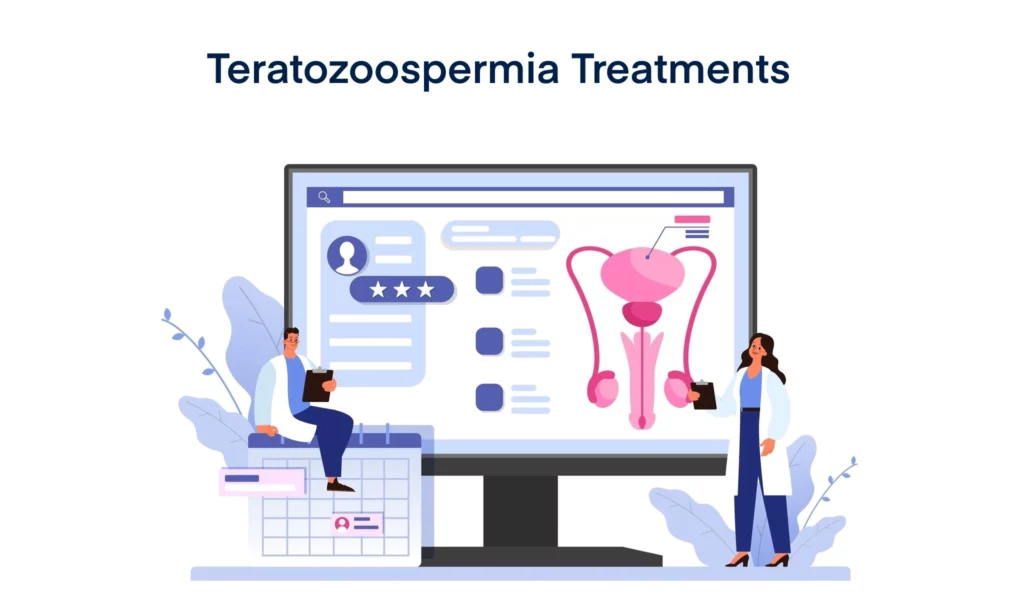
Teratospermia that is a result of controllable factors such as an inflammation, infection, diabetes or unhealthy habits have a very high chance of being treatable. But, on the other hand, teratospermia that is genetic or a result of irreversible injury, surgery or condition, the chances of possible treatment becomes very low.
Well, the good news is, as long as sperm count and motility are normal or at least good enough for conception, there are few options that can help a teratozoospermic man still have a genetic child.
Teratozoospermia Natural Treatments
A man’s sperm health is obviously dependent on certain hormones his brain and testicles produce to create sperm. What a man does, eats, how he moves, everything impacts the potential of producing these hormones.
If you get things right, your sperm count, motility and morphology will eventually start to improve. Start with quitting unhealthy habits such as eating a poor diet, smoking, drinking alcohol, consuming recreational drugs, and wearing tight clothes. Then you can add certain supplements in your diet that support male fertility such as omega-3 fatty acids, L-carnitine, antioxidants and vitamin E. You can also start doing strength-training as it boosts testosterone levels.
Getting pregnant with Teratozoospermia
If you have teratospermia and you are incapable of conceiving a child naturally, assisted reproductive technologies (ARTs) can help.
IUI
IUI, referred to as intrauterine insemination, is a first-line ART approach that involves collection of sperm, washing and concentrating them and transferring the healthiest ones in the woman’s ovaries around the time of ovulation. If the male has mild to moderate teratozoospermia, and you and your female partner do not have other fertility issues, IUI can be an effective option to achieve pregnancy.
IVF-ICSI
ICSI, intracytoplasmic sperm injection, is an advancement to the traditional IVF procedure. It involves injecting the cytoplasm of a woman’s mature egg with a healthy and normal single live sperm, to induce fertilization. In cases of moderate to severe teratospermia, ICSI can be an effective treatment option to achieve pregnancy.
IVF-IMSI
IMSI, intracytoplasmic morphologically selected sperm injection, is another advancement to the IVF-ICSI procedure. Though the procedure is somewhat similar to ICSI, it involves more detailed analysis of sperm cells before injection. A high magnification device is used to determine the morphology of the collected sperm cells, and only transfer the single sperm cell that is not morphologically defective. IMSI is best for severe cases of teratospermia.
The Bottom Line
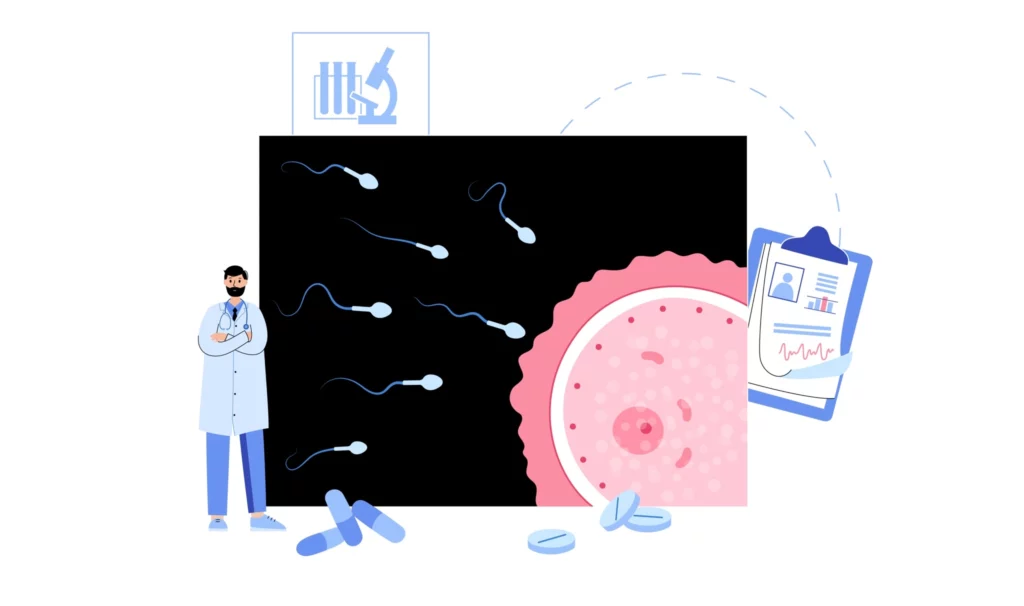
Being able to conceive a genetic child with teratozoospermia is possible. With proper diagnosis of the condition and determining its severity, the condition can be addressed and improved. There are effective treatments available such as IUI, IVF-ICSI and IVF-IMSI that can help a teratozoospermic man induce conception.
You are not alone, over 50% infertility cases in India are male-factor infertility cases. Men tend to have a drop in sperm count, sperm quality and sperm motility throughout their age. It is normal. And, it is possible for them to conceive a child with appropriate fertility help. All you would need is help from a good fertility specialist.

